2015年朝阳区高三英语期末试题及答案2015.1
- 格式:doc
- 大小:3.01 MB
- 文档页数:19
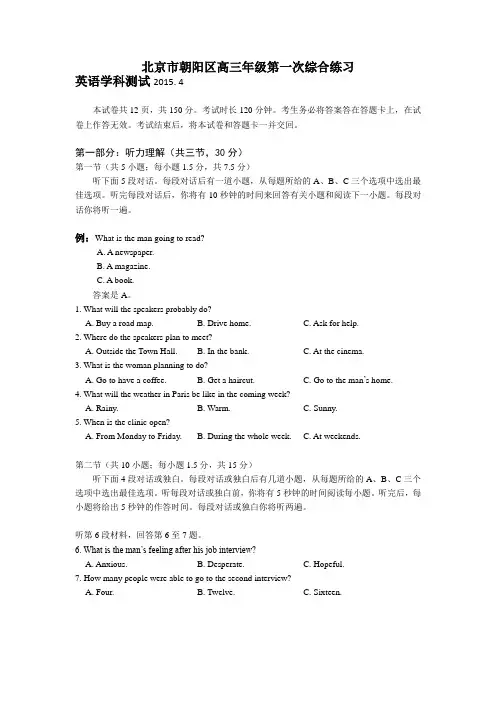
北京市朝阳区高三年级第一次综合练习英语学科测试2015. 4本试卷共12页,共150分。
考试时长120分钟。
考生务必将答案答在答题卡上,在试卷上作答无效。
考试结束后,将本试卷和答题卡一并交回。
第一部分:听力理解(共三节,30分)第一节(共5小题;每小题1.5分,共7.5分)听下面5段对话。
每段对话后有一道小题,从每题所给的A、B、C三个选项中选出最佳选项。
听完每段对话后,你将有10秒钟的时间来回答有关小题和阅读下一小题。
每段对话你将听一遍。
例:What is the man going to read?A. A newspaper.B. A magazine.C. A book.答案是A。
1. What will the speakers probably do?A. Buy a road map.B. Drive home.C. Ask for help.2. Where do the speakers plan to meet?A. Outside the Town Hall.B. In the bank.C. At the cinema.3. What is the woman planning to do?A. Go to have a coffee.B. Get a haircut.C. Go to the man’s home.4. What will the weather in Paris be like in the coming week?A. Rainy.B. Warm.C. Sunny.5. When is the clinic open?A. From Monday to Friday.B. During the whole week.C. At weekends.第二节(共10小题;每小题1.5分,共15分)听下面4段对话或独白。
每段对话或独白后有几道小题,从每题所给的A、B、C三个选项中选出最佳选项。
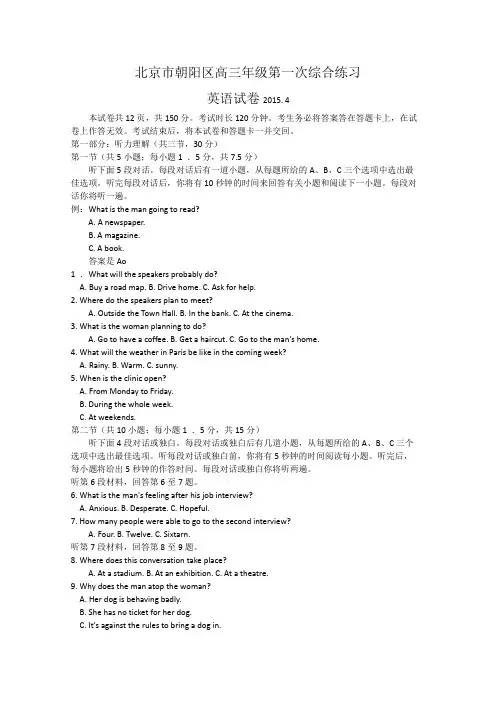
北京市朝阳区高三年级第一次综合练习英语试卷2015. 4本试卷共12页,共150分。
考试时长120分钟。
考生务必将答案答在答题卡上,在试卷上作答无效。
考试结束后,将本试卷和答题卡一并交回。
第一部分:听力理解(共三节,30分)第一节(共5小题;每小题1 .5分,共7.5分)听下面5段对话。
每段对话后有一道小题,从每题所给的A、B、C三个选项中选出最佳选项。
听完每段对话后,你将有10秒钟的时间来回答有关小题和阅读下一小题。
每段对话你将听一遍。
例:What is the man going to read?A. A newspaper.B. A magazine.C. A book.答案是Ao1 .What will the speakers probably do?A. Buy a road map.B. Drive home.C. Ask for help.2. Where do the speakers plan to meet?A. Outside the Town Hall.B. In the bank.C. At the cinema.3. What is the woman planning to do?A. Go to have a coffee.B. Get a haircut.C. Go to the man's home.4. What will the weather in Paris be like in the coming week?A. Rainy.B. Warm.C. sunny.5. When is the clinic open?A. From Monday to Friday.B. During the whole week.C. At weekends.第二节(共10小题;每小题1 .5分,共15分)听下面4段对话或独白。
每段对话或独白后有几道小题,从每题所给的A、B、C三个选项中选出最佳选项。
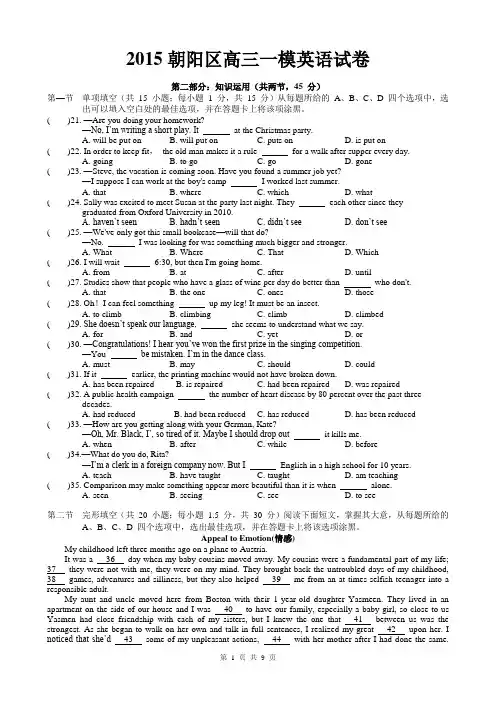
2015朝阳区高三一模英语试卷第二部分:知识运用(共两节,45 分)第—节单项填空(共15 小题;每小题1 分,共15 分)从每题所给的A、B、C、D 四个选项中,选出可以填入空白处的最佳选项,并在答题卡上将该项涂黑。
( )21. —Are you doing your homework?—No, I’m writing a short play. It at the Christmas party.A. will be put onB. will put onC. puts onD. is put on( )22. In order to keep fit,the old man makes it a rule for a walk after supper every day.A. goingB. to goC. goD. gone( )23. —Steve, the vacation is coming soon. Have you found a summer job yet?—I suppose I can work at the boy's camp I worked last summer.A. thatB. whereC. whichD. what( )24. Sally was excited to meet Susan at the party last night. They each other since they graduated from Oxford University in 2010.A. haven’t seenB. hadn’t seenC. didn’t seeD. don’t see( )25. —We've only got this small bookcase—will that do?—No. I was looking for was something much bigger and stronger.A. WhatB. WhereC. ThatD. Which( )26. I will wait 6:30, but then I'm going home.A. fromB. atC. afterD. until( )27. Studies show that people who have a glass of wine per day do better than who don't.A. thatB. the oneC. onesD. those( )28. Oh!I can feel something up my leg! It must be an insect.A. to climbB. climbingC. climbD. climbed( )29. She doesn’t speak our language,she seems to understand what we say.A. forB. andC. yetD. or( )30. —Congratulations! I hear you’ve won the first prize in the singing competition.—You be mistaken. I’m in the dance class.A. mustB. mayC. shouldD. could( )31. If it earlier, the printing machine would not have broken down.A. has been repairedB. is repairedC. had been repairedD. was repaired( )32. A public health campaign the number of heart disease by 80 percent over the past three decades.A. had reducedB. had been reducedC. has reducedD. has been reduced( )33. —How are you getting along with your German, Kate?—Oh, Mr. Black, I’, so tired of it. Maybe I should drop out it kills me.A. whenB. afterC. whileD. before( )34.—What do you do, Rita?—I’m a clerk in a foreign company now. But I English in a high school for 10 years.A. teachB. have taughtC. taughtD. am teaching( )35. Comparison may make something appear more beautiful than it is when alone.A. seenB. seeingC. seeD. to see第二节完形填空(共20 小题;每小题1.5 分,共30 分)阅读下面短文,掌握其大意,从每题所给的A、B、C、D 四个选项中,选出最佳选项,并在答题卡上将该选项涂黑。
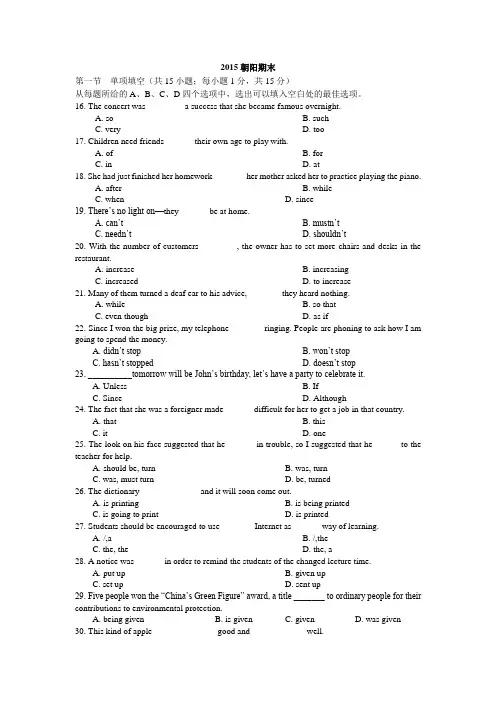
2015朝阳期末第一节单项填空(共15小题;每小题1分,共15分)从每题所给的A、B、C、D四个选项中,选出可以填入空白处的最佳选项。
16. The concert was ________ a success that she became famous overnight.A. soB. suchC. veryD. too17. Children need friends ______ their own age to play with.A. ofB. forC. inD. at18. She had just finished her homework _______ her mother asked her to practice playing the piano.A. afterB. whileC. whenD. since19. There’s no light on—they ______ be at home.A. can’tB. mustn’tC. needn’tD. shouldn’t20. With the number of customers ________, the owner has to set more chairs and desks in the restaurant.A. increaseB. increasingC. increasedD. to increase21. Many of them turned a deaf ear to his advice, _______ they heard nothing.A.whileB. so thatC. even thoughD. as if22. Since I won the big prize, my telephone _______ ringing. People are phoning to ask how I am going to spend the money.A.didn’t stopB. won’t stopC. hasn’t stoppedD. doesn’t stop23. __________tomorrow will be John’s birthday, let’s have a party to celebrate it.A. UnlessB. IfC. SinceD. Although24. The fact that she was a foreigner made ______ difficult for her to get a job in that country.A. thatB. thisC. itD. one25. The look on his face suggested that he ______ in trouble, so I suggested that he ______to the teacher for help.A. should be, turnB. was, turnC. was, must turnD. be, turned26. The dictionary _____________ and it will soon come out.A. is printingB. is being printedC. is going to printD. is printed27. Students should be encouraged to use _______ Internet as ______ way of learning.A. /,aB. /,theC. the, theD. the, a28. A notice was ______ in order to remind the students of the changed lecture time.A. put upB. given upC. set upD. sent up29. Five people won the “China’s Green Figure” award, a title _______ to ordinary people for their contributions to environmental protection.A. being givenB. is givenC. givenD. was given30. This kind of apple ______________ good and ____________ well.A. is tasted; is soldB. tastes; sellsC. is tasted; sellsD. tastes; is sold 第二节完形填空(共20小题;每小题1分,共20分)阅读下面短文,掌握其大意,从每题所给的A、B、C、D四个选项中。
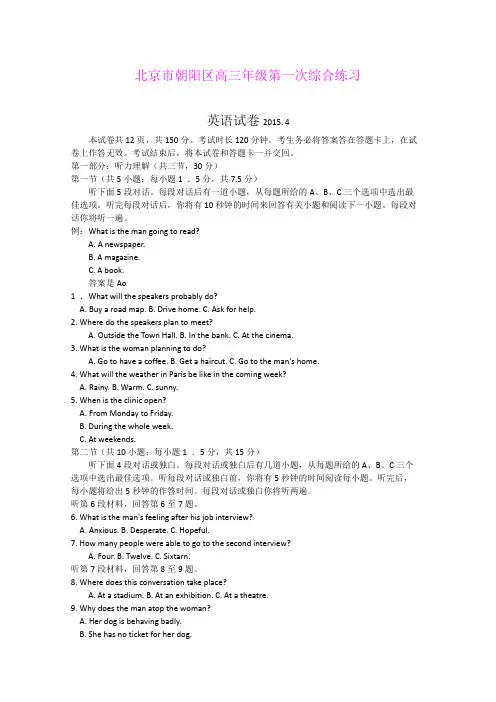
北京市朝阳区高三年级第一次综合练习英语试卷2015. 4本试卷共12页,共150分。
考试时长120分钟。
考生务必将答案答在答题卡上,在试卷上作答无效。
考试结束后,将本试卷和答题卡一并交回。
第一部分:听力理解(共三节,30分)第一节(共5小题;每小题1 .5分,共7.5分)听下面5段对话。
每段对话后有一道小题,从每题所给的A、B、C三个选项中选出最佳选项。
听完每段对话后,你将有10秒钟的时间来回答有关小题和阅读下一小题。
每段对话你将听一遍。
例:What is the man going to read?A. A newspaper.B. A magazine.C. A book.答案是Ao1 .What will the speakers probably do?A. Buy a road map.B. Drive home.C. Ask for help.2. Where do the speakers plan to meet?A. Outside the Town Hall.B. In the bank.C. At the cinema.3. What is the woman planning to do?A. Go to have a coffee.B. Get a haircut.C. Go to the man's home.4. What will the weather in Paris be like in the coming week?A. Rainy.B. Warm.C. sunny.5. When is the clinic open?A. From Monday to Friday.B. During the whole week.C. At weekends.第二节(共10小题;每小题1 .5分,共15分)听下面4段对话或独白。
每段对话或独白后有几道小题,从每题所给的A、B、C三个选项中选出最佳选项。
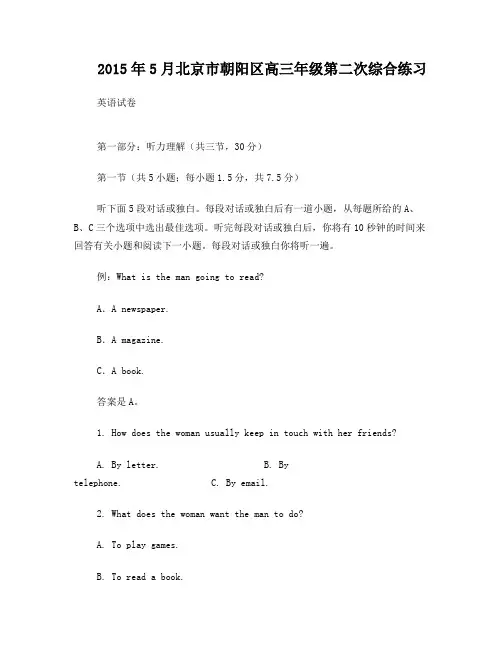
2015年5月北京市朝阳区高三年级第二次综合练习英语试卷第一部分:听力理解(共三节,30分)第一节(共5小题;每小题1.5分,共7.5分)听下面5段对话或独白。
每段对话或独白后有一道小题,从每题所给的A、B、C三个选项中选出最佳选项。
听完每段对话或独白后,你将有10秒钟的时间来回答有关小题和阅读下一小题。
每段对话或独白你将听一遍。
例:What is the man going to read?A.A newspaper.B.A magazine.C.A book.答案是A。
1. How does the woman usually keep in touch with her friends?A. By letter.B. Bytelephone. C. By email.2. What does the woman want the man to do?A. To play games.B. To read a book.C. To work all the time.3. What does the man advise the woman to do?A. To go and ask the staffB. To get a new bus schedule.C. To read the notice on the window.4. What’s the probable relationship between the two speakers?A. Boss and secretary.B. Doctor and patient.C. Interviewer and interviewee.5. Which hat does the woman want to buy?第二节(共10小题;每小题1.5分,共15分)听下面4段对话或独白。
每段对话或独白后有几道小题,从每题所给的A、B、C三个选项中选出最佳选项。
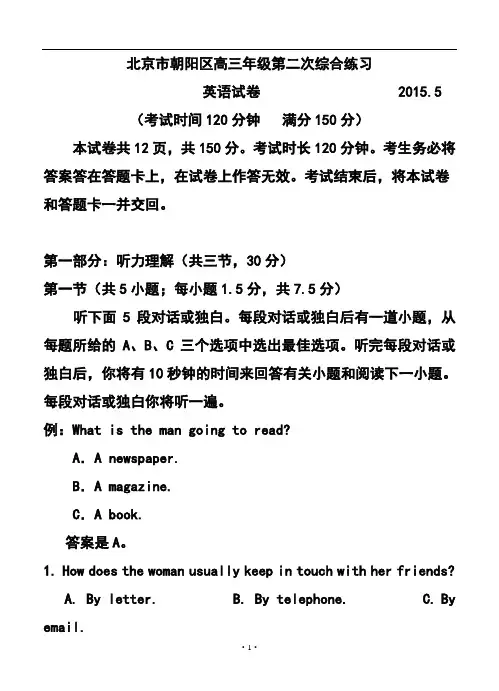
北京市朝阳区高三年级第二次综合练习英语试卷 2015.5 (考试时间120分钟满分150分)本试卷共12页,共150分。
考试时长120分钟。
考生务必将答案答在答题卡上,在试卷上作答无效。
考试结束后,将本试卷和答题卡一并交回。
第一部分:听力理解(共三节,30分)第一节(共5小题;每小题1.5分,共7.5分)听下面5段对话或独白。
每段对话或独白后有一道小题,从每题所给的A、B、C三个选项中选出最佳选项。
听完每段对话或独白后,你将有10秒钟的时间来回答有关小题和阅读下一小题。
每段对话或独白你将听一遍。
例:What is the man going to read?A.A newspaper.B.A magazine.C.A book.答案是A。
1. How does the woman usually keep in touch with her friends?A. By letter.B. By telephone.C. By email.2. What does the woman want the man to do?A. To play games.B. To read a book.C. To work all the time.3. What does the man advise the woman to do?A. To go and ask the staffB. To get a new bus schedule.C. To read the notice on the window.4. What’s the probab le relationship between the two speakers?A. Boss and secretary.B. Doctor and patient.C. Interviewer and interviewee.5. Which hat does the woman want to buy?A B C第二节(共10小题;每小题1.5分,共15分)听下面4段对话或独白。
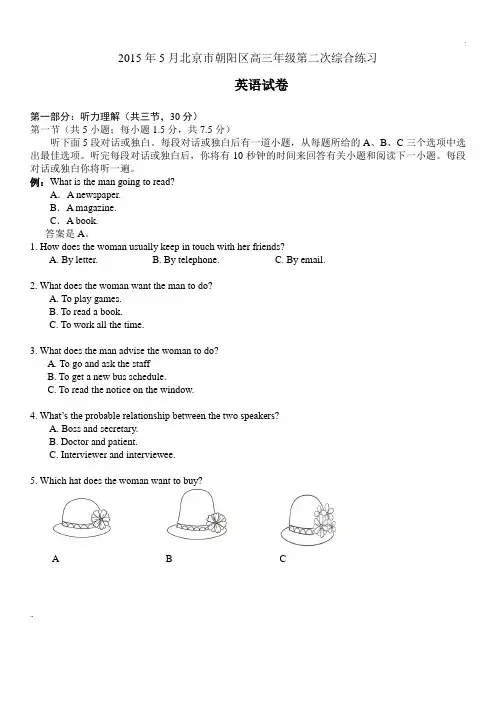
2015年5月北京市朝阳区高三年级第二次综合练习英语试卷第一部分:听力理解(共三节,30分)第一节(共5小题;每小题1.5分,共7.5分)听下面5段对话或独白。
每段对话或独白后有一道小题,从每题所给的A、B、C三个选项中选出最佳选项。
听完每段对话或独白后,你将有10秒钟的时间来回答有关小题和阅读下一小题。
每段对话或独白你将听一遍。
例:What is the man going to read?A.A newspaper.B.A magazine.C.A book.答案是A。
1. How does the woman usually keep in touch with her friends?A. By letter.B. By telephone.C. By email.2. What does the woman want the man to do?A. To play games.B. To read a book.C. To work all the time.3. What does the man advise the woman to do?A. To go and ask the staffB. To get a new bus schedule.C. To read the notice on the window.4. What’s the probable relationship between the two speakers?A. Boss and secretary.B. Doctor and patient.C. Interviewer and interviewee.5. Which hat does the woman want to buy?A B C..第二节(共10小题;每小题1.5分,共15分)听下面4段对话或独白。
每段对话或独白后有几道小题,从每题所给的A、B、C三个选项中选出最佳选项。
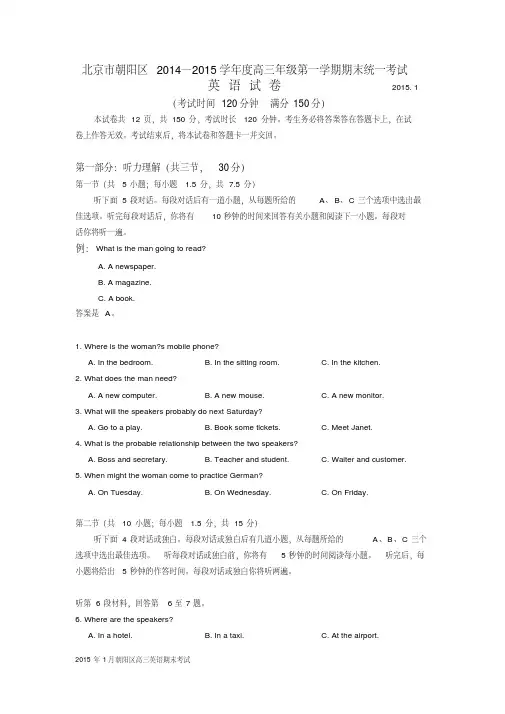
北京市朝阳区2014—2015学年度高三年级第一学期期末统一考试英语试卷2015. 1(考试时间120分钟满分150分)本试卷共12页,共150分,考试时长120分钟。
考生务必将答案答在答题卡上,在试卷上作答无效。
考试结束后,将本试卷和答题卡一并交回。
第一部分:听力理解(共三节,30分)第一节(共5小题;每小题 1.5分,共7.5分)听下面5段对话。
每段对话后有一道小题,从每题所给的A、B、C三个选项中选出最佳选项。
听完每段对话后,你将有10秒钟的时间来回答有关小题和阅读下一小题。
每段对话你将听一遍。
例:What is the man going to read?A. A newspaper.B. A magazine.C. A book.答案是A。
1. Where is the woman?s mobile phone?A. In the bedroom.B. In the sitting room.C. In the kitchen.2. What does the man need?A. A new computer.B. A new mouse.C. A new monitor.3. What will the speakers probably do next Saturday?A. Go to a play.B. Book some tickets.C. Meet Janet.4. What is the probable relationship between the two speakers?A. Boss and secretary.B. Teacher and student.C. Waiter and customer.5. When might the woman come to practice German?A. On Tuesday.B. On Wednesday.C. On Friday.第二节(共10小题;每小题 1.5分,共15分)听下面4段对话或独白。
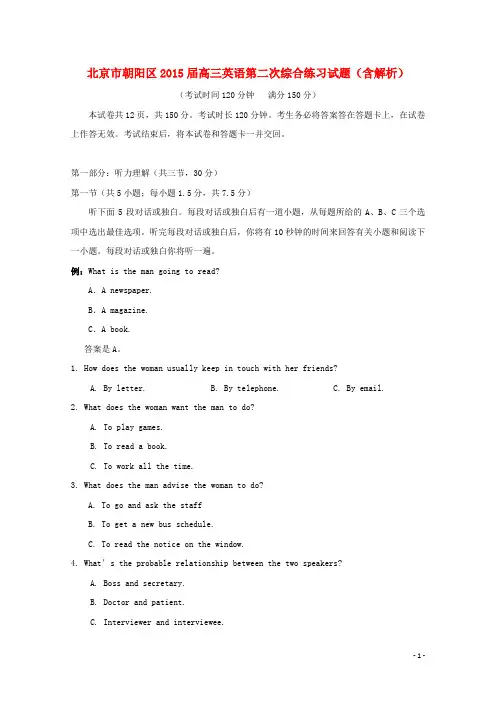
北京市朝阳区2015届高三英语第二次综合练习试题(含解析)(考试时间120分钟满分150分)本试卷共12页,共150分。
考试时长120分钟。
考生务必将答案答在答题卡上,在试卷上作答无效。
考试结束后,将本试卷和答题卡一并交回。
第一部分:听力理解(共三节,30分)第一节(共5小题;每小题1.5分,共7.5分)听下面5段对话或独白。
每段对话或独白后有一道小题,从每题所给的A、B、C三个选项中选出最佳选项。
听完每段对话或独白后,你将有10秒钟的时间来回答有关小题和阅读下一小题。
每段对话或独白你将听一遍。
例:What is the man going to read?A.A newspaper.B.A magazine.C.A book.答案是A。
1. How does the woman usually keep in touch with her friends?A. By letter.B. By telephone.C. By email.2. What does the woman want the man to do?A. To play games.B. To read a book.C. To work all the time.3. What does the man advise the woman to do?A. To go and ask the staffB. To get a new bus schedule.C. To read the notice on the window.4. What’s the probable relationship between the two sp eakers?A. Boss and secretary.B. Doctor and patient.C. Interviewer and interviewee.5. Which hat does the woman want to buy?A B C第二节(共10小题;每小题1.5分,共15分)听下面4段对话或独白。
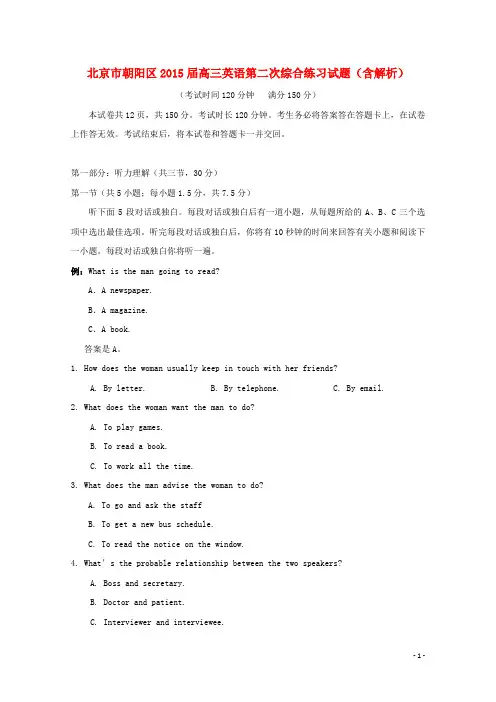
北京市朝阳区2015届高三英语第二次综合练习试题(含解析)(考试时间120分钟满分150分)本试卷共12页,共150分。
考试时长120分钟。
考生务必将答案答在答题卡上,在试卷上作答无效。
考试结束后,将本试卷和答题卡一并交回。
第一部分:听力理解(共三节,30分)第一节(共5小题;每小题1.5分,共7.5分)听下面5段对话或独白。
每段对话或独白后有一道小题,从每题所给的A、B、C三个选项中选出最佳选项。
听完每段对话或独白后,你将有10秒钟的时间来回答有关小题和阅读下一小题。
每段对话或独白你将听一遍。
例:What is the man going to read?A.A newspaper.B.A magazine.C.A book.答案是A。
1. How does the woman usually keep in touch with her friends?A. By letter.B. By telephone.C. By email.2. What does the woman want the man to do?A. To play games.B. To read a book.C. To work all the time.3. What does the man advise the woman to do?A. To go and ask the staffB. To get a new bus schedule.C. To read the notice on the window.4. What’s the probable relationship between the two sp eakers?A. Boss and secretary.B. Doctor and patient.C. Interviewer and interviewee.5. Which hat does the woman want to buy?A B C第二节(共10小题;每小题1.5分,共15分)听下面4段对话或独白。
北京市朝阳区2014—2015学年度高三年级第一学期期末统一考试英语试卷2015. 1(考试时间120分钟满分150分)本试卷共12页,共150分,考试时长120分钟。
考生务必将答案答在答题卡上,在试卷上作答无效。
考试结束后,将本试卷和答题卡一并交回。
第一部分:听力理解(共三节,30分)第一节(共5小题;每小题1.5分,共7.5分)听下面5段对话。
每段对话后有一道小题,从每题所给的A、B、C三个选项中选出最佳选项。
听完每段对话后,你将有10秒钟的时间来回答有关小题和阅读下一小题。
每段对话你将听一遍。
例:What is the man going to read?A. A newspaper.B. A magazine.C. A book.答案是A。
1. Where is the woman‟s mobile phone?A. In the bedroom.B. In the sitting room.C. In the kitchen.2. What does the man need?A. A new computer.B. A new mouse.C. A new monitor.3. What will the speakers probably do next Saturday?A. Go to a play.B. Book some tickets.C. Meet Janet.4. What is the probable relationship between the two speakers?A. Boss and secretary.B. Teacher and student.C. Waiter and customer.5. When might the woman come to practice German?A. On Tuesday.B. On Wednesday.C. On Friday.第二节(共10小题;每小题1.5分,共15分)听下面4段对话或独白。
每段对话或独白后有几道小题,从每题所给的A、B、C三个选项中选出最佳选项。
听每段对话或独白前,你将有5秒钟的时间阅读每小题。
听完后,每小题将给出5秒钟的作答时间。
每段对话或独白你将听两遍。
听第6段材料,回答第6至7题。
6. Where are the speakers?A. In a hotel.B. In a taxi.C. At the airport.7. When will the woman have to leave her room tomorrow?A. At 12:00 pm.B. At 1:30 pm.C. At 4:30 pm.听第7段材料,回答第8至9题。
8. What makes the woman worried?A. That she is told to drop the course.B. That she cannot get a lot of practice.C. That she may get a poor score in French.9. What will the woman probably do?A. Ask the man‟s friend for help.B. Make a call to her French teacher.C. Practice speaking French with the man.听第8段材料,回答第10至12题。
10. What is the man?A. A tennis fan.B. A reporter.C. A student.11. What is the woman doing?A. Waiting for a tennis star.B. Watching a tennis match.C. Queuing up for a tennis match.12. Where does the woman come from?A. London.B. Berlin.C. Wimbledon.听第9段材料,回答第13至15题。
13. What does the speaker ask the students to keep with them?A. A school map.B. A library card.C. A list of classes.14. Where will the students probably spend a lot of time?A. In the Math Department.B. In the library.C. In the cafeteria.15. What is the speaker doing?A. Introducing the school tour to new students.B. Giving new students advice on taking classes.C. Describing the school buildings to new students.第三节(共5小题;每小题1.5分,共7.5分)听下面一段对话,完成第16至20五道小题,每小题仅填写一个..词。
听对话前,你将有20秒钟的时间阅读试题,听完后你将有60秒钟的作答时间。
这段对话你将听两遍。
Lost Property (财产) Form第二部分:知识运用(共两节,45分)第一节单项填空(共15小题; 每小题1分,共15分)从每题所给的A、B、C、D四个选项中,选出可以填入空白处的最佳选项,并在答题卡上将该项涂黑。
例:It‟s so nice to hear from her again. ______, we last met more than thirty years ago.A. What‟s moreB. That‟s to sayC. In other wordsD. Believe it or not答案是D。
21. His wife didn‟t allow him _____ any drink or tobacco.A. touchingB. to touchC. touchD. touched22. We couldn‟t find the hotel and it was getting dark, _____we got out a map and studied itcarefully.A. soB. andC. butD. or23. —Jack, let‟s go swimming.—Sorry, I‟m busy right now. I _____ for the exam tomorrow.A. prepareB. am preparingC. have preparedD. will prepare24. _____ in the business world for three months, Dora got tired of it and decided to turn toteaching.A. To workB. WorkingC. Having workedD. Worked25. A student _____ friends are good at academics may be urged to study harder and get goodgrades.A. whoB. thatC. whoseD. whom26. —I‟d like to borrow this book, but I couldn‟t find it on the shelf.—The book has been checked out. I‟ll let you know as soon as it _____.A. returnedB. will be returnedC. is returningD. is returned27. Everyone makes mistakes, but the real test is _____ you react to that.A. howB. whatC. thatD. why28. I took four books with me when I went travelling _____ I got bored, but I never read a page!A. in caseB. so thatC. as long asD. as soon as29. Many kids develop problems from finger sucking that can create life-long problems unless_____ properly.A. treatB. treatingC. to treatD. treated30. —Ah, Anita. Is the design for the conference center ready?—I _____ on it for over a month, but I haven‟t finished it yet.A. workedB. had workedC. have been workingD. was working31. The concert bored me to death. I wish I _____ it.A. wouldn‟t have attendedB. have not attendedC. did not attendD. had not attended32. —Guess who I met at the shopping center today? Angelina Jolie! She _____ her new filmthen.—You were so lucky!A. had promotedB. has promotedC. is promotingD. was promoting33. Only after posting the postcard _____ I hadn‟t put a stamp on it.A. did I rememberB. had I rememberedC. I had rememberedD. I remembered34. _____ for a signature photo if you see Justin Bieber backstage after the concert.A. AskB. AskingC. To askD. Asked35. —I worked as hard as I could, but I still failed the exam.—Hard work isn‟t the whole story. You _____ the basic techniques of study.A. must have masteredB. would have masteredC. should have masteredD. might have mastered第二节完形填空(共20小题;每小题1.5分,共30分)阅读下面短文,掌握其大意,从每题所给的A、B、C、D四个选项中,选出最佳选项,并在答题卡上将该项涂黑。